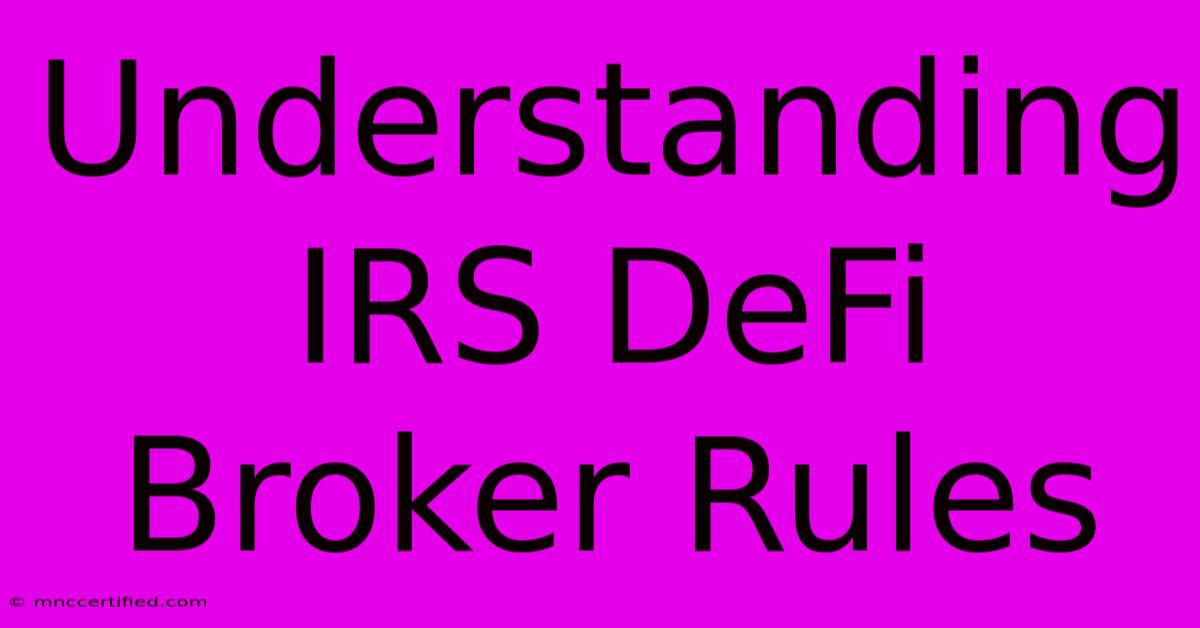Understanding IRS DeFi Broker Rules

Table of Contents
Understanding IRS DeFi Broker Rules: A Comprehensive Guide
The decentralized finance (DeFi) space has exploded in popularity, offering innovative financial tools and services. However, this rapid growth has brought increased scrutiny from regulatory bodies, particularly the Internal Revenue Service (IRS) in the United States. Understanding the IRS's evolving stance on DeFi and its implications for brokers is crucial for navigating this complex landscape. This article will delve into the key aspects of IRS DeFi broker rules, helping you understand your obligations and avoid potential penalties.
What Constitutes a DeFi Broker Under IRS Rules?
The IRS hasn't explicitly defined "DeFi broker" in a single, concise statement. Instead, it relies on existing regulations and interpretations to determine who qualifies. Currently, the focus centers on entities facilitating transactions involving digital assets on DeFi platforms. This can include, but isn't limited to:
-
Decentralized Exchanges (DEXs): Platforms like Uniswap or PancakeSwap, where users trade cryptocurrencies without intermediaries, may be considered brokers depending on their specific operations and level of involvement in facilitating trades. This is a particularly gray area, as DEXs are designed to be decentralized. The IRS is likely to target DEXs with centralized features or those providing significant custodial services.
-
Yield Farming Platforms: Services that offer interest or rewards for staking or lending cryptocurrencies might be considered brokers if they provide substantial assistance in facilitating these transactions.
-
Lending and Borrowing Platforms: Similar to yield farming platforms, lending and borrowing platforms might fall under the IRS's definition of a broker based on the level of their involvement in facilitating transactions.
-
Automated Market Makers (AMMs): While AMMs are integral to many DEXs, the IRS's view on their broker status remains unclear and will likely depend on their specific implementation and involvement in facilitating trades.
The key determining factor is the level of participation in facilitating transactions. Simply providing a platform isn't enough; the IRS will likely focus on entities actively involved in matching buyers and sellers, providing custodial services, or otherwise significantly facilitating the trading process.
Information Reporting Requirements for DeFi Brokers
If classified as a DeFi broker, you'll be subject to stringent information reporting requirements under the Internal Revenue Code, specifically focusing on Form 1099-B. This form reports proceeds from brokerage transactions and is essential for the IRS to track capital gains and losses for tax purposes. Crucially, this applies to all transactions facilitated, regardless of whether a profit or loss was realized.
Key Challenges in Reporting DeFi Transactions:
-
Anonymity: The pseudonymous nature of blockchain transactions makes tracking individual users a significant challenge. The IRS is actively developing methods to improve this tracking.
-
Cross-border Transactions: The global nature of DeFi transactions adds complexity to enforcement and reporting.
-
Complex Transaction Types: The wide variety of DeFi protocols and interactions—swaps, yield farming, lending, etc.—poses a challenge in developing a standardized reporting framework.
Penalties for Non-Compliance
Failing to comply with IRS DeFi broker rules carries severe penalties. These can include:
- Significant financial penalties: The IRS can impose substantial fines for non-compliance.
- Criminal charges: In severe cases, criminal charges could be filed.
- Reputational damage: Non-compliance can severely damage a company's reputation and trustworthiness.
Staying Ahead of the Curve: Best Practices for DeFi Businesses
The DeFi regulatory landscape is constantly evolving. To ensure compliance and avoid potential penalties, DeFi businesses should:
- Stay informed: Keep abreast of the latest IRS guidance and updates.
- Seek professional advice: Consult with tax attorneys and CPAs specializing in cryptocurrency and DeFi.
- Develop robust compliance programs: Implement internal controls and processes to ensure accurate record-keeping and reporting.
- Collaborate with regulators: Engage in constructive dialogue with regulatory bodies to contribute to a clearer regulatory framework.
Disclaimer: This article provides general information and should not be considered legal or tax advice. Consult with qualified professionals for advice tailored to your specific situation. The information provided here is based on current understanding and may be subject to change. The IRS's interpretation of DeFi broker rules is evolving, so staying updated is paramount.

Thank you for visiting our website wich cover about Understanding IRS DeFi Broker Rules. We hope the information provided has been useful to you. Feel free to contact us if you have any questions or need further assistance. See you next time and dont miss to bookmark.
Featured Posts
-
Irs Data Breach Taxpayer Notices
Dec 28, 2024
-
Syracuse Football 2025 Schedule
Dec 28, 2024
-
Christmas Engagement Dua Lipa Callum Turner
Dec 28, 2024
-
Hannitys Engagement A Fox News Love Story
Dec 28, 2024
-
Hannity Earhardt Announce News
Dec 28, 2024